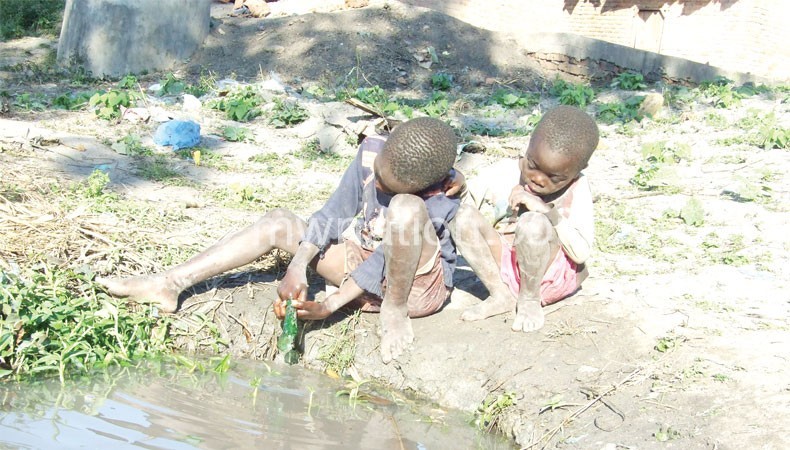MHC, Salisbury Line tussle over septic tanks

Prince Phiri, seven, with his younger brother, Junior, five, have not known plastic toys in their lives. All they have known are local toys made from soil on the banks of a metre deep soak away drain in their neighbourhood.
The secret with the soil on these banks is that it is kept wet with water drained from septic tanks on their parents’ plot. This makes it easy for the boys to mould toys.
When dirty, the two do not worry where to clean up. A metre away from the main drain is a smaller one, stagnant with water.
This is also an attraction to their sister, Elube, 10 and her friends who use its water for washing.
This is normal for children at Salisbury Line, a slum in Mzuzu; after all, their parents have bigger battles to fight than this one.
Living with sewage
Septic tanks and soak away drains catering for 36 houses owned by Malawi Housing Corporation (MHC) in New Katoto are planted in Salisbury Line on plots CJ/412/VE and CJ/411/O owned by Mike Phiri and Osman Phiri respectively.
But MHC claims they compensated Osman with K25 000 in 2009 for the plot, which Osman denies saying that the K25 000 was for the demolition of his toilet and kitchen.
On the other hand, Mike claims MHC never compensated him for his two-bedroomed house they demolished when they were constructing the tanks.
Too close, miles apart
Although New Katoto and Salisbury Line are close to each other in distance separated by a gravel road, the two are miles apart in class and social services.
Salisbury Line is a mushy slum with deplorable living and environmental health conditions, characterised by inadequate water supply, poor sanitation, overcrowding and dilapidated houses.
But their neighbour, a medium density area, is all that is not Salisbury Line with houses mostly owned by MHC.
A visit by Nation on Sunday to the area last week was welcomed with a disgusting odour emanating from tanks standing less than a metre away from Mike’s house.
Apart from that, two children were spotted playing around with water in one of the three trenches which had stagnant water drained from the tanks.
“We endure bad smell everyday from the time they constructed these tanks,” says Mike, who shares a surname with Osman, although not related.
In the past three months, children around the area developed sores on their bodies, which the community suspect is as a result of these open drains. But medical reports did not confirm this.
“Our children spend most of their time playing in these drains. Over 20 of them developed this strange illness. We strongly suspect that it is because of these tanks,” explains Mike.
In 2011, surrounding communities were involved in a row with the Northern Region Water Board (NRWB) and MHC over the same septic tanks.
The community complained of contaminated water from a communal tap after NRWB pipe close to the septic tanks burst.
“We were drinking coloured water and after tests were conducted, it was discovered the water was contaminated,” says Andrew Gondwe, senior block leader of the area.
According to a High Court document under civil cause number 162 of 2010 in our possession, NRWB and MHC compensated 46 individuals with a sum of K2.5 million for damages.
Septic tanks imposed on them
Osman recalls how MHC invaded his plot to construct tanks.
“They told me that only pipes would pass through my plot. They said they needed to demolish my toilet and kitchen because that’s where the pipes would pass through. But I was surprised later to find they started constructing the tanks.
“It affected me greatly, but there was nothing I could do because they said they had the authority from the city council,” he said.
Osman denies receiving compensation for the land, saying: “If they compensated me for the plot, the city council should have written off my name. But the plot is still in my name; I pay city rates up to date.”
His neighbour Mike also claims MHC pulled down his two-bedroomed house without compensation.
“They never involved me. They just came, brought down my two-bedroomed house, and started constructing the tanks. I tried to talk to them, but they said all land belongs to the city.
“I was surprised because this has been my plot since 1985. I also pay city rates every year. So, how can this be land for the council?” he wonders.
Last month, Mike paid K500 for city rates to the council. According to the receipt we have seen, he has outstanding balances of K8 178.91 for city rates and K9 907.50 for ground rent for the plot.
“What we don’t understand is that MHC started constructing the tanks in Katoto, only to abandon the project and bring it to our plots. Is it because we are poor? But they need to be considerate because we are not benefitting from this land anymore. It is MHC which is making profits,” complains Mike.
MHC estates officer Roosevelt Msiska confirms abandoning their initial project of constructing tanks in Katoto and moved to Salisbury Line.
“We needed a slanting land for easy movement of the sewage. Our initial land was not slanting enough,” he says
Search for justice
Former chief executive officer for the council, Thomas Chirwa blames the two Phiris.
“If they own the land and they had evidence at the time the tanks were being constructed, they should have made a claim to stop MHC.
“But it seems there is something wrong with this story; why wait all that long and start making such claims now?” wondered Chirwa, who expressed ignorance of the case, referring the matter to the council’s director of planning and development (DPD).
DPD Alex Chirambo referred the matter to MHC.
When MHC officials learnt about Nation on Sunday’s inquiries, they rushed to the site for inspection. They deployed officers to extend the soak away drain to minimise blockades or spillage.
“We are extending the drain to be seven metres deep. We will then put stones and cover them with a plastic and soil. This will be done to reduce smell,” said MHC acting regional manager Esther Mtenje, who was in the company of three other MHC officials at the time of interview.
She, however, brushed aside claims that they invaded land belonging to the two.
“We have records to prove we compensated owner of the land, Osman Phiri. Regional housing office-[North] valued the property at K25 000 on May 28 2009 and we paid the money.
“It is not true that there was a house. We only pulled down a toilet and a small kitchen,” said Mtenje, who prevented Nation on Sunday from seeing the said documents.
The officials then invited Nation on Sunday to accompany them to the site to appreciate efforts they were making to address the bad odour.
On our arrival, we were greeted by the sight of four children washing clothes using water from a ditch on the plot. MHC workers were also extending the main drain.
Desperate
Mike has since submitted the issue to a private practice lawyer George Kadzipatike who is examining the matter.
Apart from Kadzipatike, Mike has also reported the matter to a local non-governmental organisation, Centre for Community Organisation and Development (Ccode), which is implementing a participatory slum upgrading programme (PSUP) in the area.
Statistics in Malawi indicate that seven out of 10 people in urban areas live in informal settlements; that is about 1.7 million Malawians live in slums, according to Ministry of Lands and Housing.
In Mzuzu, the 2008 Mzuzu City Council Draft Profile indicates the city has a total of 12 slums and over 60 percent of its residents live in these squatters.





